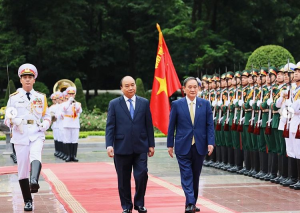Yesterday, Vietnam’s newly appointed Foreign Minister Bui Thanh Son spoke on the phone with his Japanese counterpart Motegi Toshimitsu, during which the pair flagged areas of common interest and pledged to advance their nations’ strategic partnership.
As per the coverage in Vietnamese state media, the topic of the discussion between the two close partners was relatively anodyne, ranging from COVID-19 cooperation to trade and investment. According to the media paraphrase, Son said that Vietnam considers Japan “a long-term strategic partner of utmost importance and wants to bolster cooperation with the country.”
Notably (and unsurprisingly), the ministers “also exchanged views on international and regional matters of shared concern, including East Sea issues,” as Vietnam refers to the disputes in the South China Sea. Recent weeks have been marked by tensions between China and the Philippines in disputed parts of the Spratly Islands, due to Beijing’s deployment of an intimidating flotilla of maritime militia vessels around Philippine-occupied features.
Otherwise, the call was intended as a diplomatic ice-breaker between Son, who was appointed to his post on April 8, and a nation that is an increasingly important partner of Vietnam.
Relations between Vietnam and Japan have been on an upward trajectory for more than a decade. Under Prime Minister Abe Shinzo, Japan advanced the relationship on the back of increased trade and Japanese backing for large-scale infrastructure development in Vietnam. In 2014, the two countries announced an “extensive strategic partnership,” and security ties have deepened apace.
The progress in bilateral relations has continued under Prime Minister Suga Yoshihide, who took office in September last year after Abe’s resignation for health reasons. In January, Suga visited Vietnam on his maiden overseas trip, during which he signed an agreement allowing his government to export defense equipment and technology to Vietnam.
The upward trajectory reflects the two nations’ overlapping interests, centered on their shared concern about China’s growing power and influence in their immediate neighborhood. Both countries have active maritime disputes with China – in the East and South China Seas, respectively – while engaging in tens of billions worth of trade with China each year.
Perhaps the most notable thing about the Son-Motegi call was its timing, coming on the final day of a state visit by China’s Defense Minister Wei Fenghe. During the three-day trip to Hanoi, Wei held extensive talks with his Vietnamese counterpart Phan Van Giang and President Nguyen Xuan Phuc.
According to Vietnamese state media, the two leaders spoke about the COVID-19 pandemic and the situation in the South China Sea. The coverage was also replete with flowery language and references to the eternal friendship of the two communist parties – a hint of the paramount position that China occupies in Vietnam’s foreign policy. While the relationship is shot through with mistrust, rooted in a historical pattern of Vietnamese resistance to Chinese domination, the two ruling communist parties share a host of common interests – not least their determination to remain in power – and the two nations’ economies are deeply enmeshed.
In this respect it was also notable that Foreign Minister Son’s call with his Japanese counterpart took place nearly two weeks after an April 16 call with Chinese Foreign Minister Wang Yi. Wei’s visit to Vietnam also came after security talks between the two sides in the southern Chinese city of Dongxing, in which they agreed to work together to improve trust amid simmering tensions over their dueling territorial claims in the South China Sea.
This week’s two diplomatic encounters exemplify the omnidirectional balance that Vietnam seeks to achieve in its foreign relations, in large part to offset the crushing proximity of China and maintain the nation’s strategic autonomy. While China is the most important of Vietnam’s foreign relationships, in the sense of being the most complex and fraught, Japan increasingly looms as a close second.

































